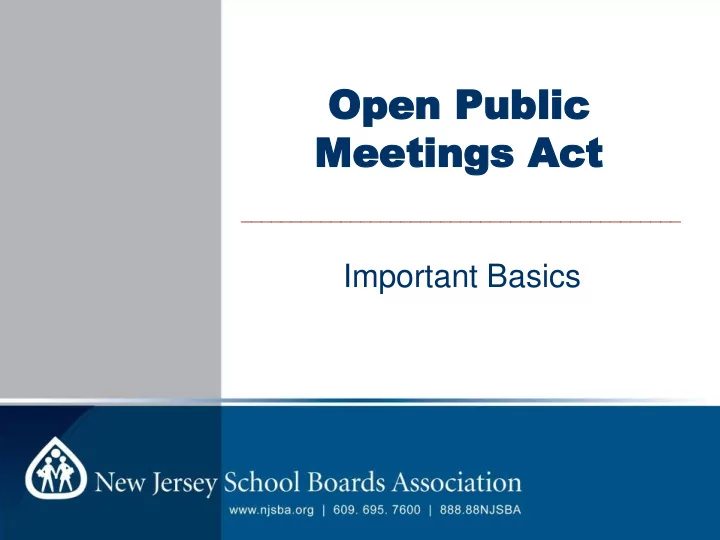

Open Public Open Public Meetings Meetings Act Act ____________________________________________ Important Basics
OPEN PUBLIC MEETINGS ACT (Sunshine Law) Apply to “public bodies” including • boards of education • charter school boards of trustees
OPMA EXCERPT “The Legislature finds and declares that the right of the public to be present at all meetings of public bodies, and to witness in full detail all phases of the deliberation, policy formulation, and decision making of public bodies …”
OPMA EXCERPT “ is vital to the enhancement and proper functioning of the democratic process; that secrecy in public affairs undermines the faith of the public in government and the public’s effectiveness in fulfilling its role in a democratic society…”
OPMA EXCERPT “ … it is the public policy of this State to insure the right of its citizens to have adequate advance notice of and the right to attend all meetings of public bodies at which any business affecting the public is discussed or acted upon in any way.”
OPEN PUBLIC MEETINGS ACT • The OPMA applies to meetings where a quorum of the board is present to discuss public business • It does not apply to committee meetings • Electronic communications raise special concerns
OPEN PUBLIC MEETINGS ACT • Board secretary is charged with providing advance notice so the public can attend and hear the discussion. • Boards must hold discussions publicly… unless the topic falls under one of the exceptions permitting closed sessions • Boards must pass a resolution prior to going into a closed session • Boards must keep minutes of both open and closed meetings
NOTICE AND AGENDA • Regular – time, date, location. In 2 newspapers, posted, notice within 7 days of reorganization. • Special – 48 hrs. Time, date, location. Whether formal action; agenda to extent known. • Emergency – Unforeseen & delay would result in substantial public harm. ¾ vote of members present. Notice ASAP.
RELEASE OF MINUTES • Must be made “promptly available.” • NJQSAC: publicly available within 2 weeks or by the next board meeting. • Closed session: When no longer a reason for confidentiality.
COMMON REASONS FOR CLOSED SESSION • Personnel – “Rice” notice • Student matters • Collective negotiations • Attorney client/litigation (Note: there are about 10 reasons)
PUBLIC PARTICIPATION • Is the public entitled to provide comment during a portion of every meeting? • Does the board determine the timing of the public portion of its meeting ? • May a board direct members of the public that they may not make negative statements about staff during the public portion ?
PUBLIC PARTICIPATION • 2008: Must set aside a portion of every meeting for public comment on school district issues – board determines time, place, and manner of restrictions. • Ties in to NJQSAC requirements. • Board must not discriminate on the basis of the content of the speech. Rulings penalize board.
PUBLIC PARTICIPATION Governance section of NJQSAC Annual Statement of Assurance: When appropriate, the board obtains public input and provides information to district staff as it relates to community expectations. The board also implements the Open Public Records Act (OPRA) pursuant to N.J.S.A. 47:1A-1 et seq.).
OPMA AND TECHNOLOGY • Telephone/email/text communications between board members may constitute a meeting and be in violation of OPMA. • While there are no NJ reported decisions, analogize to physical meetings. • Look to guidance from other states.
OPMA AND TECHNOLOGY Guidelines when communicating electronically: • Not a substitute for deliberations at a board meeting. • Communications are a public record. • Adhere to the district’s acceptable use policy. • Avoid reference to confidential information.
OPMA AND TECHNOLOGY Suggested practices: • No 2-way electronic communication. • Use a district-issued email address. – Easier to retrieve for OPRA requests – Records retention – internal communication 1 year. External – 3yrs. • Avoid communication strings.
QUESTIONS? Thank you for inviting NJSBA to your meeting. Charlene Peterson Field Service Representative cpeterson@njsba.org 609-218-2186
Recommend
More recommend